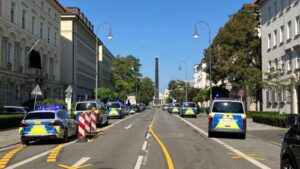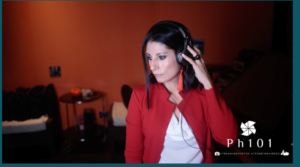by Stefano Piazza

One person died this morning during a shooting that occurred near the Nazi Documentation Center, located in the Karolinenplatz area in the heart of Munich, Germany. According to Süddeutsche Zeitung, which cites police sources, the victim was a man who attacked the center and was shot by police officers. The area, which also houses Israel’s Consulate General, has been cordoned off. The man, as Bild writes, was identified as Emra I., who was born in Austria in 2006, and according to the “Spiegel” and the “Standard,” the terrorist was known to authorities as an Islamist. The car he drove to the scene had Salzburg license plates, and the terrorist was armed with a Mauser carbine with bayonet.
The site of the attack is of special historical significance and also sensitive from a security point of view: the Nazi Documentation Center is located between Brienner Strasse and Karolinenplatz and was built on the ruins of the so-called “Brown House,” the former headquarters of the National Socialist Party, which opened in 2015. The Israeli Consulate General moved nearby in the same year, into a Free State office building formerly used by the State Lottery Administration and later adapted to the needs of the consulate. This decision caused an uproar at the time: 70 years after the Holocaust, Israel’s representative office was being placed in the heart of the former Nazi quarter, built around the party headquarters. Both buildings, considered high-risk, require continuous special protection provided by the Bavarian police and, for the consulate, also by Israeli security forces. In late May, the Israeli Consulate General had been targeted in an attack: during the night, unknown persons threw a false explosive device over the protective fence.
According to police, it was “a plastic bottle similar to a Molotov cocktail,” containing a projectile. Today also marks the anniversary of the Munich Olympic bombing: 52 years ago, Palestinian “Black September” terrorists attacked the Israeli Olympic team in their quarters. At the end of the crisis, during the failed liberation attempt at the Fuerstenfeldbruck air base, 11 Israelis and a German police officer died. What happened this morning in Germany is but yet another incident of an Islamist attempting to attack Jewish institutions driven by hatred and anti-Semitism very often conveyed by social networks like X where there are now no rules. Speaking of this, we asked Elisa Garfagna a voice actor, podcaster and analyst of the phenomena of anti-Semitism on the web to understand these phenomena.

“In recent years, there has been a worrying increase in incidents of anti-Semitism in different parts of the world: the United States and Italy are no exception. These events, often labeled as “isolated,” manifest themselves in varied forms, such as vandalism against synagogues, physical assaults on members of Jewish communities, and increasing anti-Semitic rhetoric in public discourse and the media. Social networks have played a crucial role in the spread of hate ideologies, becoming a fertile ground for the propagation of anti-Semitic content. Platforms such as Facebook, Twitter and Instagram allow extremist groups to communicate and organize, facilitating the spread of messages that, in the past, would have struggled to find a place in traditional communication channels. The virality of social media allows “problematic” content to reach a wide audience, often without proper filtering. This phenomenon not only amplifies negative ideas about Jews, but also normalizes behavior that can result in acts of violence.”
In addition, social networks are frequently used to spread conspiracy theories and misinformation about the Jewish community. What is happening in Italy?
“The idea that Jews control the financial world, or the media is an ancient narrative that has found new life online, fueling hatred and suspicion. This situation is aggravated by the platforms’ algorithm, which tends to promote content that generates more interaction, regardless of its ethical or truthful content. Regarding the situation in Italy, it must be said that the country retains valuable antibodies, but anti-Semitism is not a foreign phenomenon. In recent years, several incidents of anti-Semitism have been documented, often linked to political and social tensions. Some of these acts are clearly inspired by far-right ideologies, but there are also manifestations of anti-Semitism from a wider range of political backgrounds. Italian authorities, together with numerous civil society organizations, are actively working to combat anti-Semitism.
There are initiatives to raise awareness of the importance of historical memory and the fight against all forms of hatred. However, the problem persists and requires constant attention; social networks have a major impact on anti-Semitism, facilitating the spread of harmful content and contributing to the radicalization of individuals and groups. In Italy, although there are efforts to counter these phenomena, it is crucial to continue to monitor and address anti-Semitism in all its forms. Only through a combination of education, awareness and legislation can we hope to reduce the incidence of these incidents and promote a more inclusive society that respects diversity.”

